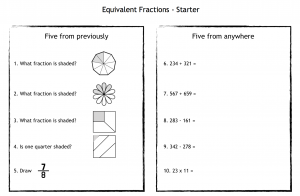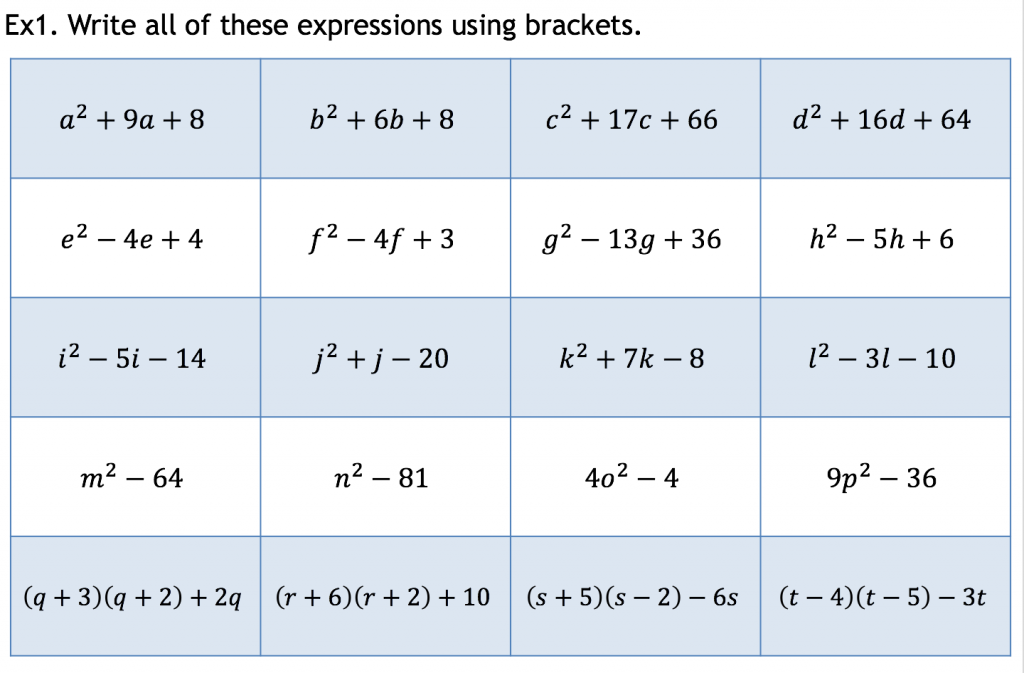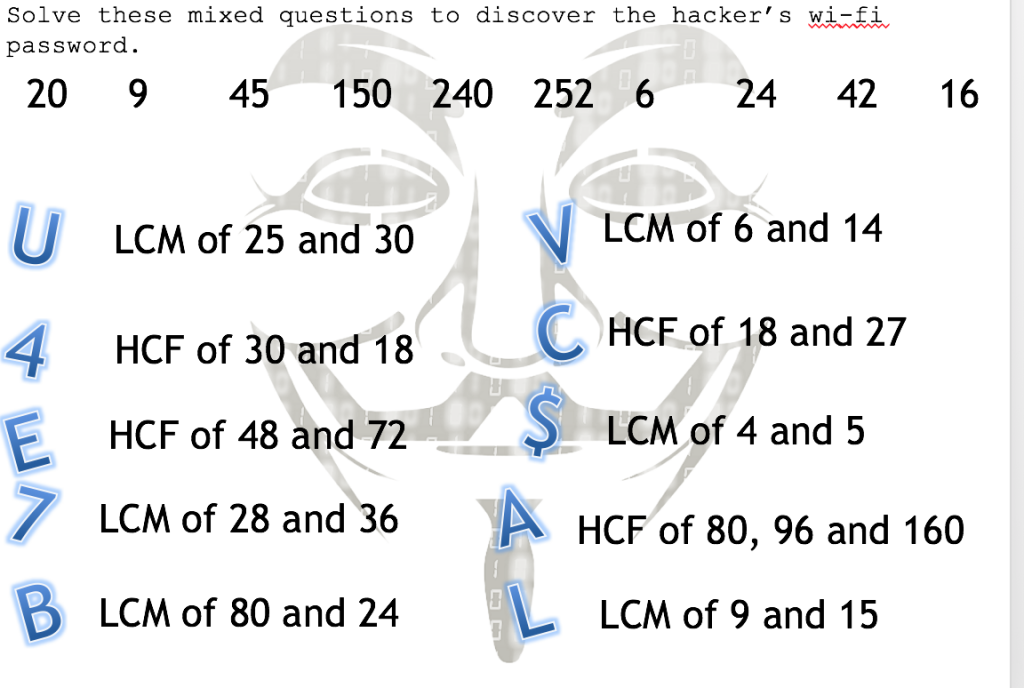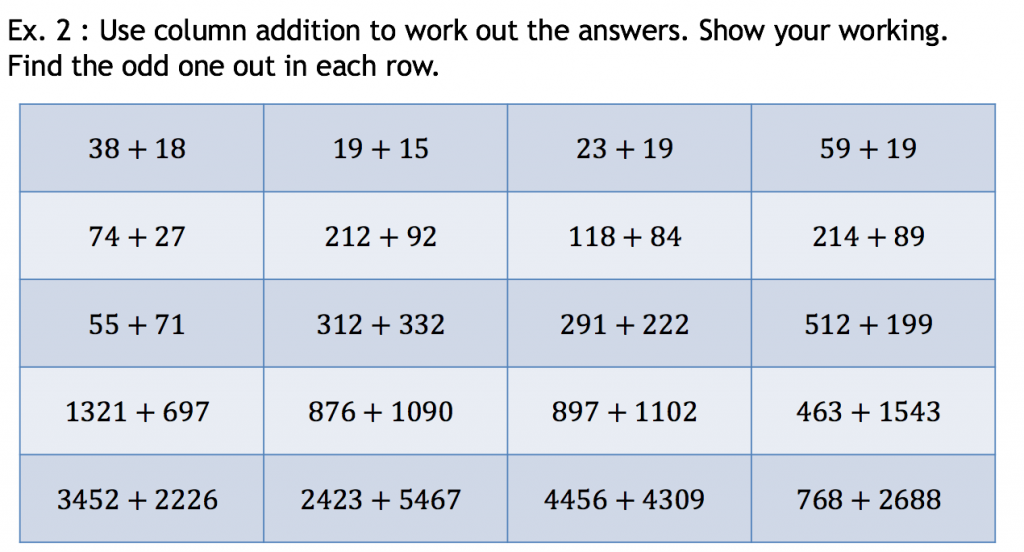So welcome to my lesson. Pens out. One to fifteen in your margins. Nothing new, it’s a review. Question one..
https://bennewmark.wordpress.com/2017/11/13/nothing-new-its-a-review-on-why-i-killed-my-starters/

So welcome to my lesson. Pens out. One to fifteen in your margins. Nothing new, it’s a review. Question one..
https://bennewmark.wordpress.com/2017/11/13/nothing-new-its-a-review-on-why-i-killed-my-starters/

Search Alex Gendler on youtube for more.
A few years ago I had some difficult year 10s. Instead of doing their work they would play a game called Bananas. One of them would give the others a letter, and they would each try and come up with a film, a popstar etc that started with that letter.
I decided to turn the tables on them and made a maths version.
I think literacy in mathematics often gets overlooked. Many students struggle with the words we use and their meanings. They also often struggle to decode questions. This helps to a limited degree, and it’s fun. Often when a student completes each category, it’s a worthwhile conversation talking about the words they have come up with and what their definitions are.
The online version is here. It’s set up to display nicely on a whiteboard.
If I were to modify this, I might make it so that some letters are more frequent than others.
It’s difficult to do for z.
I teach a group with low prior attainment.
One thing I noticed is that they often lack the knowledge that other students take for granted, which holds them back.
We were discussing the questions “Write as a decimal” and their lack of knowledge that
really held them back.
I thought back to spelling tests I did as a kid, learning the fact, covering up and then being tested on the word. These seemed to quite effective, and I thought I could do a similar thing with maths. So I designed some maths ‘spelling’ tests. You can download them here. At the moment, there’s only 4 of them. Hopefully by sharing the PowerPoint and format, people can adapt them. If you do this, please share your versions below.
Was slightly against putting these up as it’s not a complete topic yet, and probably won’t be for a while.
These are lessons to be taken ‘off the shelf’. Each ppt contains an explanation, several different tasks, a problem solving task and a learning check. These require no printing.
Expanding double brackets: I’ve used grid
Factorising : I have tried to use some advice from the Dan Meyer blog If Math(s) is the asprin, what is the headache? I’ve seen Dan Meyer speak. He was brilliant. I recommend following his blog. PowerPoint includes quadratics with . Was pretty proud of the problem solving task on this one.
I collect misleading graphs. Here’s an excellent one I saw today.

What’s wrong with it? There’s more than the obvious.
How would you regraph it?
Here’s some other weird ones.
Although maybe it’s wrong to call these graphs
These are ‘infographics’ not graphs. Heathenous maths person… 😉
— TheProvokedPedagogue (@Provokedpedagog) October 9, 2017
I’ve been thinking about meta-task recently. That is, the point of doing something. I recently created the task below for my year 10 class.

On the surface this seems OK to me. It isn’t just lots of the same thing, questions increase in difficulty and type by row (whilst still allowing a little bit of practice in each set) however it definitely lacks DRIVE and motivation to complete it.
I usually have a few tricks to work around this. One of these is using a code breaker. I have adapted these tasks from ‘Collect A Joke’ type activities. I like a collect a joke, but often the task is ruined by students just guessing the words. I’ve tried to mitigate against this by having the code be an assortment of letters and numbers. It still has the problem of one person getting the answer and sharing it, though, thus making everyone immediately stop trying to work out the answer.

Another thing I use a lot is ‘find the odd one out’. I think this works really well, however I can’t do this for every single task.

Maybe I’m missing the point. Maybe well designed questions that draw out learning are engaging in their own right, and by adding in ‘meta-tasks’ I’m making my lessons less about the objective I’m trying to teach that lesson.
I’d appreciate any thoughts that people have. Do you have any meta-tasks you like, or do you think meta-tasks are wrong?
If you click the menu at the top, or do a search, you can find all the lesson slides I’ve been talking about.
These are lessons to be taken ‘off the shelf’. Each ppt contains an explanation, several different tasks, a problem solving task and a learning check. These require no printing.
Compound measures: Speed, density & pressure.
Area and volume scale factors : I think the questions here are possibly too dull. Maybe when I tweek this I might link it with standard form as a way to deal with large and small numbers.
These are lessons to be taken ‘off the shelf’. Each ppt contains an explanation, several different tasks, a problem solving task and a learning check. These require no printing.
Tried to add in lots of visual sequences here.
Finding the next term: Can be rather boring, so lots of questions where there’s ‘gaps’. For instance 8, __, __, 14.
Term to term rules: I’ve used a bit advanced notation here. I don’t know how to teach this better. Comment below if you do.
nth term: I go for the ‘write your nth term and compare’ route.
Generating a sequence from an nth term: Substitution, basically, innit. I’ve tried to add in some horrible sequences to generate from to make students think including fractional ones and shape ones.
Quadratic nth term: Concentrating on why halving the second difference works
ProjectALessons
These are lessons to be taken ‘off the shelf’. Each ppt contains an explanation, several different tasks, a problem solving task and a learning check. These require no printing.
I will tweek the animations on these when I do them again. I think the questions are also a bit…lame. There’s a few sections where the questions don’t really increase in difficulty or change form too much.
Inequality Notation: Edited in March 2019 to separate it from solving inequalities. Added lots more stuff and redrew all the number lines.
Solving Inequalities : New for March 2019. Separated it out. Now lots more rigorous and lots more and better questions asked.
Compound inequalities: Even bigger (31 slides). Includes writing, linking into writing error intervals. Also includes solving compound inequalities.
Practice
Assess